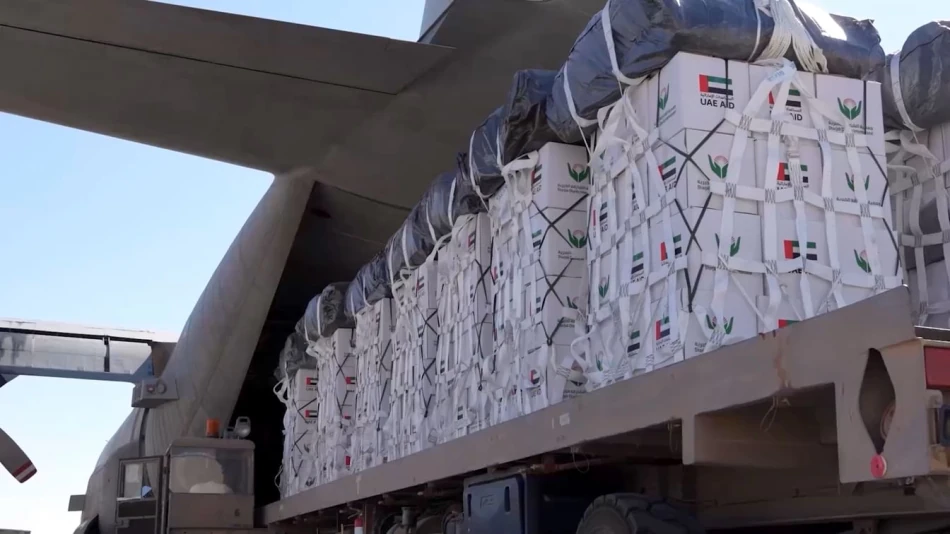
UAE Executes 79th Aerial Humanitarian Airlift in 'Birds of Goodness' Op to Support Gaza
UAE Delivers 79th Humanitarian Airdrop to Gaza as Regional Aid Operations Intensify
The United Arab Emirates has completed its 79th airdrop mission to Gaza as part of its "Birds of Goodness" operation, bringing total aerial aid deliveries to over 4,052 tons since the campaign began. The latest mission, conducted in partnership with Jordan, Germany, and Indonesia, underscores the UAE's strategic positioning as a regional humanitarian hub while other Gulf states expand their soft power through crisis response operations.
Multilateral Coordination Marks New Phase
Today's airdrop represents a significant evolution in the UAE's approach to Gaza relief efforts. Unlike earlier solo missions, the operation involved four nations working in coordinated fashion—a model that reflects broader diplomatic trends in Middle Eastern crisis management. The inclusion of Germany and Indonesia alongside traditional regional partner Jordan signals the UAE's ability to bridge Western, Arab, and Southeast Asian humanitarian networks.
The delivered supplies consisted primarily of essential food items, prepared with support from Emirati charitable foundations and organizations. This public-private partnership approach has become a hallmark of UAE foreign aid strategy, allowing the government to scale operations while maintaining domestic civic engagement.
Strategic Implications for Regional Leadership
Soft Power Competition Heats Up
The UAE's sustained commitment to Gaza aid operations—now totaling over 4,000 tons—positions the country alongside Qatar and Saudi Arabia in a subtle competition for regional humanitarian leadership. While Qatar has historically dominated Gaza aid through direct financial transfers, the UAE's aerial delivery method offers greater visibility and demonstrates operational capabilities that extend beyond financial contributions.
This approach mirrors successful humanitarian diplomacy models used by countries like Turkey and Germany, where consistent aid delivery builds long-term diplomatic capital and regional influence.
Operational Sophistication
The "Birds of Goodness" operation showcases the UAE's advanced logistical capabilities, particularly important as the country positions itself as a global humanitarian logistics hub. The sustained nature of these operations—79 missions and counting—demonstrates institutional capacity that few regional players can match.
The multilateral coordination aspect also serves UAE interests in normalizing its role as a regional diplomatic facilitator, a position that could prove valuable in future Middle Eastern negotiations and crisis responses.
Broader Context and Future Outlook
The UAE's Gaza aid strategy reflects lessons learned from previous humanitarian crises in Yemen, Syria, and Lebanon, where sustained engagement often translated into post-conflict influence and reconstruction opportunities. By maintaining consistent aid flows while building international partnerships, the UAE is positioning itself for potential roles in Gaza's eventual reconstruction and economic development.
The involvement of Germany and Indonesia suggests the UAE is successfully internationalizing what began as a regional Arab response, potentially creating templates for future crisis interventions across the Middle East and beyond. This model of multilateral humanitarian coordination could become increasingly important as regional conflicts require sustained international responses.
The continuation of these operations, despite logistical challenges and regional tensions, signals that the UAE views humanitarian diplomacy as a core component of its foreign policy strategy—one that delivers both immediate humanitarian impact and long-term strategic benefits.
Most Viewed News

 Sara Khaled
Sara Khaled






